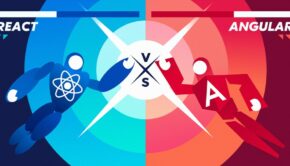Building Your Dream App? React Native or Flutter?
Introduction
When building an app the list of questions to be answered is immense. Design, UI, functionality will have a host of questions that come along throughout development. One of the biggest questions to answer right from the beginning is to choose React Native or Flutter when building a cross-platform app. When answering the question it is not a matter about which one is better, rather which will serve your needs the best.

Photo by Clément H on Unsplash
Incredibly Useful Frameworks
In the great react native vs flutter debate what is often overlooked is what they both have in common. Both are capable of coding cross-platform apps while using only one code language base. They both feature hot reloading, great UI, a range of useful tools as well as native features. All of these features combined makes sure that both React Native and Flutter are great tools to have in your arsenal but there are significant differences to consider.
Languages
React Native is written and uses JavaScript as its coding language. This has been seen as a major advantage as JavaScript is continually one of the most popular programming languages seen in the professional realm year on year. This allows any JavaScript developer to easily pick up and learn React Native.
Flutter, on the other hand, is written in the relatively new programming language Dart. The language is widely regarded as easy to learn and a good language capable of what users set out to do. If the developer has a background in C++ or Java then learning Dart will be even easier as it shares similarities with those languages. For many React Native may be the obvious choice given how widespread JavaScript is, however, learning a new language with a slightly steeper learning curve can be beneficial.
Performance
It is easier to argue that React Native is better based on how widespread JavaScript is across the globe. Flutter does have better performance for one very important reason. React Native requires a JavaScript bridge in order to run and allow interaction with components. Dart code conversely is compiled to machine code and then run. This will improve the performance of Dart as it does not need the JavaScript bridge that React Native needs.
Rate of Adoption
React Native has been around longer than Flutter, meaning that React Native has a clear advantage in terms of adoption. Products like Facebook, Instagram, Uber Eats, Tesla, Bloomberg, and many more use React Native for their mobile apps. This has further led to the popularity of React Native. This is the current reality that results in jobs for React Native being in high demand.
This may not be the case for long though. With Google backing the development of Flutter it has caused quite a stir and garnered significant amounts of attention. Currently, Alibaba and Google Ads have incorporated Flutter into their mobile apps. With such backing Flutter, developers can be expected to have their skills increase in demand.
Conclusion
Currently, we are seeing significant changes in the mobile development landscape. Corporations no longer want to invest in developing apps for a variety of platforms available to consumers. Technology has enabled the development of cross-platform presenting attractive possibilities to business, saving costs.
This need has driven the development of React Native and Flutter, both very capable frameworks. The choice as with many comes down to personal preference. The decider should be on what you are comfortable to be with and your past experience. If you are a JavaScript developer the obvious choice would be React Native, while if you have past experience with C++ or Java then Flutter may be the right choice.
















